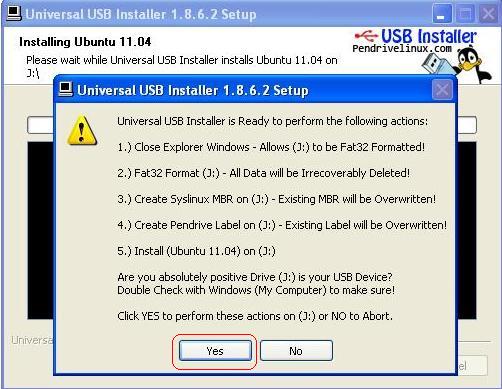

- #Install ubuntu from usb how to
- #Install ubuntu from usb install
- #Install ubuntu from usb iso
- #Install ubuntu from usb download
Before writing anything we give hours in testing and executing the process to ensure you get a 100% working solution. The above article does not aim at comparing the two methods. You will be able to log into a live Linux Environment only if supported. Remember, All the distro don’t allow Live Environment, but most of today’s distro does. You should know, what you are doing, as you won’t get any manual/prompt/help at run time, you must be good in terminals.No room for error, an error, and everything is wiped.Kali Linux Boot Menu Pros of the above method: When USB is booted, You will be greeted with a window similar to.

Now safely eject the disk, plug it into the machine you want to boot with Linux, and Yup doesn’t forget to change the booting option in your BIOS, setting your flash stick to boot primarily.
#Install ubuntu from usb iso
It will take time to create the boot-able disk depending upon the size of the ISO image and your RAM capacity.ĭon’t interrupt the boot stick creation, once the process is completed, you will get something like this in your terminal. # dd if=/home/server/Downloads/ of=/dev/sdb1 bs=512M sync Run the below command with modification depending upon your source and destination. Sync option allows you to copy everything using synchronized I/O. The bite Size is generally “ some power of 2, and usually, not less than 512 bytes i.e., 512, 1024, 2048, 4096, 8192, 16384, but can be any reasonable whole integer value. The basic syntax of dd command is dd if= of= bs= sync

It is used by the Linux kernel Makefiles to make boot images. The dd command is capable of striping headers, extracting parts of binary files.
#Install ubuntu from usb install
You will be greeted with a window as below, from where you can boot into Live Linux Mode and/or Install on Hard Disk from there, directly. Restart it and set that usb storage device to boot first from the BIOS menu which maybe F12, F8, F2, or Del depending upon your machine and build. Plug out the usb storage device safely and plug it into the machine you want to boot.
#Install ubuntu from usb download
It will take time depending upon the size of the download and/or the file size of the ISO image. Create Bootable Linux USB-DriveĬlick OK, and the process of downloading and/or extracting the image will start.

Although it is a time taking process and may result in an error when a larger image is downloaded. Or alternatively download from the internet, in real-time. You can browse to the stored disk image on your hard drive, from the Unetbootin window. A wrong selection will lead to wiping your hard disk, so be aware. The type should be Usb Device, strictly and if more than one usb device is plugged in you need to know the name of the exact Usb device you need to work upon. Unetbootin ToolĬheck the content above the red line. Insert Your USB pen-drive into the Windows/ Linux machine and Launch Unetbootin, you will be greeted with a window similar to. $ sudo add-apt-repository ppa:gezakovacs/ppaĪlternatively, you can download UNetbootin binaries and run them without installing on the Linux systems (supports all Linux distributions). To install UNetbootin on Ubuntu and Ubuntu-based Linux distributions, use the following apt command to add PPA and install it.
#Install ubuntu from usb how to
Related Read: How to Install Linux OS on USB Drive and Run it On Any PC We will be creating USB boot-able image in two different way


 0 kommentar(er)
0 kommentar(er)
